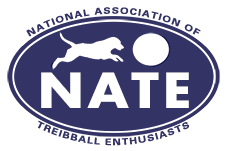-
-
-
-
-
-
-
-
-
-
-
Basics - Directional Cues Skills
-
-
-
-
-
 |
|
Basics - Directional Cues Skills
Directional cues are a foundation skill for the more complex games of Balls In Order, Snooker, and Urban Herding. It's the ability to move your dog on the field while the handler remains in the box. Since Treibball is a timed event, getting one’s dog to follow directions to the desired position on the field is a key skill. This page focuses on the skill level needed to be successful in Directional Cues Skills Certification.
Directional Cues skills build on those learned in the Basics Push and Send Skill pages and are usually taught after the dog demonstrates a clear understanding of the Send and Lining Up behind an object at a distance of at least 15 feet.
|
|
|
There are two ways to think about moving a dog on the field: straight lines or a circular manner. Either way works! A combination of the two works! The key is to be consistent in what the cues mean to you and your dog. When thinking of movement with straight lines, people use cues to move the dog further out (Go Out), closer in (Walk Up/On), laterally to the left (Over, Left), and laterally to the right (Over, Right). When thinking of movement with circular patterns on the field, people use cues to move the dog clockwise (Come Bye), counterclockwise (Away), closer in (Walk Up/On), and further out (Look Back, Come Bye/Away). Typically, the dog is trained to always circle all the objects/balls on the field until they are cued to stop. In the Directional Cues Skills Tests, two or three objects are placed in a line parallel to the handler box. The goal is show the dog can be moved to several places on the field to stop behind objects. The tests are designed so either way of cueing will work. In the video above circular cues were used. It is easy to see that a dog trained with straight line cues could do the same movements. As one progresses to the Pre-Novice Standard game with a triad of 3 balls and eventually to the Expert level with 8 balls in a triangle, the importance of circular sends becomes more apparent. |
Move Laterally
One of the keys to directional movement success is having a clear word that tells the dog to move laterally. In the videos below they are using the verbal cue Over. Pick any term for yourself that is clear to the dog and not readily confused for another cue (e.g. No and Go). While not demonstrated, one might also consider having separate terms for moving to the right or left. This can be useful in Balls In Order, Snooker, and Urban Herding.
The videos shared below show sequential steps for first introducing one's dog to the concept and cue to leave one object or ball and shift laterally in the direction indicated to another object or ball. If the dog were being trained with circular cues, the Come Bye and Away cues could have used instead of Over.
We thank Monica Pielage for the first video featuring Joan and Tucker on how to introduce the dog to moving laterally.
The second video demonstrates the next step of slowly adding distance and using mats behind each ball to reinforce the correct position for the dog. Thank you to Monica Pielage for this video featuring Fabie and Storm.
|